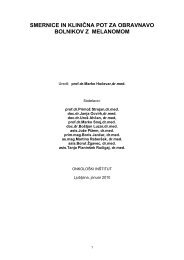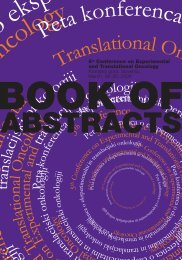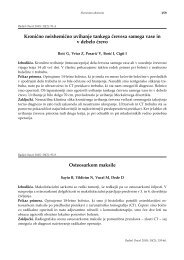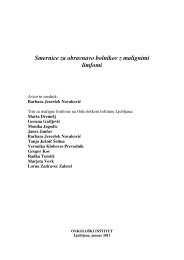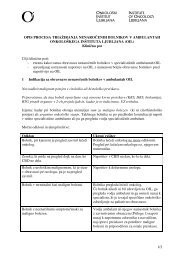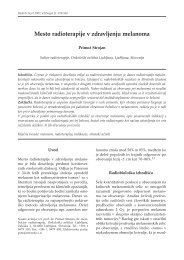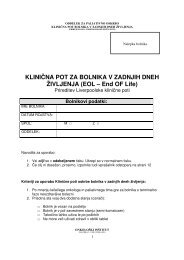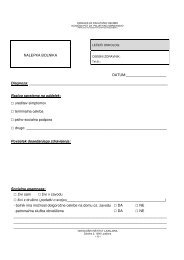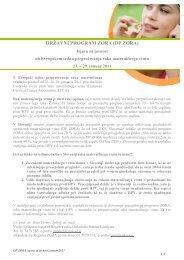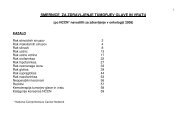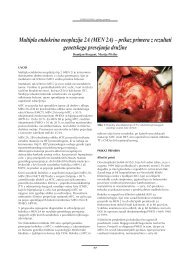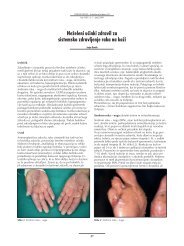Create successful ePaper yourself
Turn your PDF publications into a flip-book with our unique Google optimized e-Paper software.
Tumor cell- and macrophage-derived cathepsin<br />
B promotes progression and lung metastasis of<br />
mammary cancer<br />
Olga Vasiljeva 1 , Achim Krüger 2 , Anna Papazoglou 1 , Harald Brodoefel 1 ,<br />
Matvey Korovin 1 , Kaspar Amholt 3 , Boye S. Nielsen 3 , Christoph Peters 1 ,<br />
and Thomas Reinheckel 1<br />
1<br />
Department of Molecular Medicine and Cell Research, Albert-Ludwigs-University<br />
Freiburg, Stefan Meier Strasse 17, Germany; 2 Klinikum rechts der Isar der Technischen<br />
Universität München, Institut für Experimentelle Onkologie und Therapieforschung,<br />
München, Germany; 3 Finsen Laboratory, Rigshospitalet, Copenhagen, Denmark<br />
Tumor progression is a multi-step process that is accompanied by invasive<br />
proteolytic activity. Numerous experimental and clinical evidence has linked<br />
cathepsin B with tumor invasion and metastasis through its remodeling of the<br />
extracellular matrix. To investigate the role of the cysteine protease cathepsin B in<br />
tumor progression and metastasis, we crossed cathepsin B-deficient mice (ctsb -/ ) with<br />
a mouse strain that develops mammary tumors due to the expression of the polyoma<br />
virus middle-T oncogene (PyMT). We showed that PyMT;ctsb -/- exhibited a significantly<br />
delayed onset and reduced growth rate of mammary cancers compared to wildtype<br />
PyMT mice. Lung metastasis volumes were significantly reduced in PyMT;ctsb +/- , an<br />
effect that was not further enhanced in PyMT;ctsb -/- mice. Furthermore lung colonisation<br />
studies of PyMT cells with different CTSB genotypes injected into congenic wildtype<br />
mice and in vitro matrigel-invasion assays confirmed a specific role for tumor-derived<br />
CTSB in invasion and metastasis. Interestingly, cell surface labeling of cysteine<br />
cathepsins by the active site probe DCG-04 detected upregulation of cathepsin X<br />
on PyMT;ctsb -/- cells. Treatment of cells with a neutralizing anti-cathepsin X antibody<br />
significantly reduced matrigel-invasion of PyMT;ctsb -/- cells but did not affect invasion<br />
of PyMT;ctsb +/+ or PyMT;ctsb +/- cells, indicating a compensatory function of cathepsin<br />
X in CTSB-deficient tumor cells. Finally, an adoptive transfer model in which ctsb +/+ ,<br />
ctsb +/- and ctsb -/- recipient mice were challenged with PyMT;ctsb +/+ cells was used<br />
to address the role of stroma-derived CTSB in lung metastasis formation. Notably,<br />
ctsb -/- mice showed reduced number and volume of lung colonies and infiltrating<br />
macrophages showed a strongly upregulated expression of CTSB within metastatic<br />
cell populations. These results indicate that both cancer cell-derived and stroma<br />
cell (i.e. macrophages) derived CTSB plays an important role in tumor progression<br />
and metastasis.<br />
l11<br />
25



